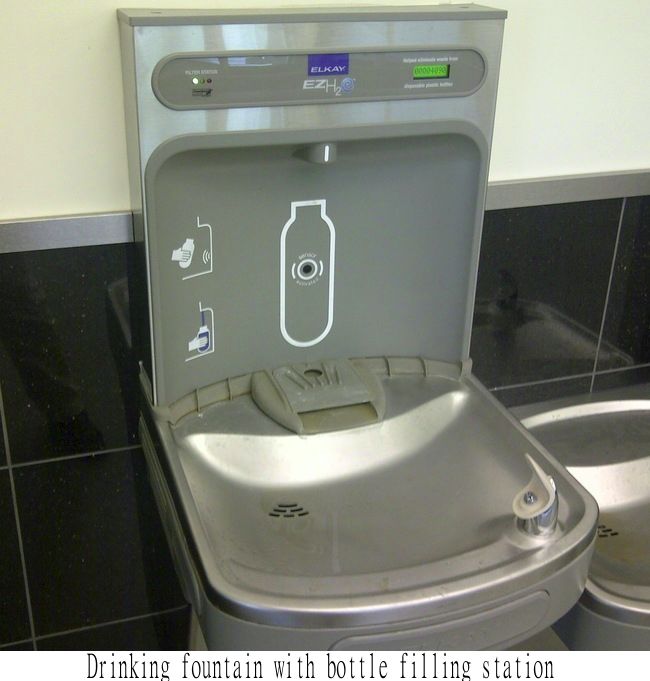Everyone is suddenly talking about the problem of buying water in small quantities in plastic bottles. We are learning that the plastic adds chemicals to the water, that the water is often just tap water and is never really special or even tested, that tap water is more reliable because it is regulated and that the bottles are a wasteful indulgence that aren’t recycled or reused but just fill up dumps. Yukkkkk!!! What a terrible product. And all because it is cold, available and thirst quenching. There must be a better way to deliver water to people.
And of course there is. We all know about water fountains but there is never one when you need it and half the time they don’t work. Is it possible that our high tech society can’t solve these problems. I don’t believe it!
There are a number of reasons for choosing this project, as shown below:
- A popular movement has arisen that rejects these bottles as frivolous and unnecessary and even harmful.
- They are a major commercial presence so that replacing them is commercially and socially significant.
- There has also arisen a popular appreciation that much of the water used in these bottles is not spring water or cleaner water at all but is simply municipal tap water. This realization is leading to a revulsion against what is seen as a deception by the water bottle companies.
- Taste tests have been carried out which have usually shown that the much vaunted taste superiority of bottled waters to tap water disappears as soon as the labels are hidden. We can anticipate that this result will be general.
Meanwhile, we have learned about the deceptions of the plastics industry over many decades which have led to all the problems of plastic refuse, including those of plastic bottles. See video :
Let’s imagine that we are willing to make a commitment to providing safe, clean, city water to everyone who needs it, where and when she wants it. Is this an unattainable ideal?
Let’s talk about those bottles. Do we need to ban them? I think that banning should be saved for serious emergencies. Ban landmines, ban hydrogen bombs, but when it comes to water bottles, just as with garbage, the better way is to simply make them irrelevant and silly (use humor!) and let them mostly fade away.
Remember our general response to containers. If water bottles are going to continue to pollute our commercial landscape, okay, they need to be changed to refillable forms. But even then, why can’t we make a simple social commitment to supply drinking water fountains EVERYWHERE!
Where is everywhere? Do you think that the dept. of Public Works officials can figure out where people get thirsty on hot days? On streets, in malls, in parks, near schools, hospitals, movie theatres and restaurants. That’s a start. But here is the kicker.
We need to require that anyone who sells any bottled water is required to have a convenient drinking water fountain right nearby. Let’s simply eliminate the monopoly that bottle water enjoys. Let anyone who wants to sell bottled water, finance the installation of a nearby fountain.
We need to design a simple fountain that can be replicated all over a city. It should be robust, with all replaceable parts so that it can last a hundred years or more. It will have a shelf to hold a refillable bottle while it is being filled and an overhead tap. Any public work this ubiquitous in a city should also be accompanied by public art work.
In addition, we need to deal with the public misunderstanding about tap and bottled water. Each drinking water fountain should have a backboard with a sign explaining that tap water is known to be clean and healthful because it is monitored and tested while bottled water is unregulated (and often just tap water).
We also need to deal with the other end of the problem – the availability of refillable bottles. It would be reasonable to require that anyone who sells pre-bottled water also needs to sell one or more models of sturdier, refillable bottles. They can be polyethylene, polycarbonate, aluminum, steel, glass or Spanish botas. But some kind! And to make them easy to keep track of, there should be some way to label them with the name and number of the buyer. Otherwise interchangeable bottles will be showing up in garbage, when people lose track of which is their bottle and which is not.
Is there anything here that is beyond the ability of a progressive city or county? I doubt it. But we are so afflicted with the defeatist notion that we can do nothing but recycle empty plastic bottles after the social and economic damage is done, that the naysayers have taken the field, to the benefit of the water bottle distributors and their multi-billion dollar market. However, after a few years of this kind of program, I think bottled water will simply vanish and fillable bottles will proliferate.
Recently, (2022) The Intercept published a story which builds on the absurd claim by the Blue Triton company (they own a third of all water bottling companies) that their bottles are environmentally sustainable. What did they say about their claims, when challenged? That their claims are obvious puffery which no one should be fooled by! Here is the article.

